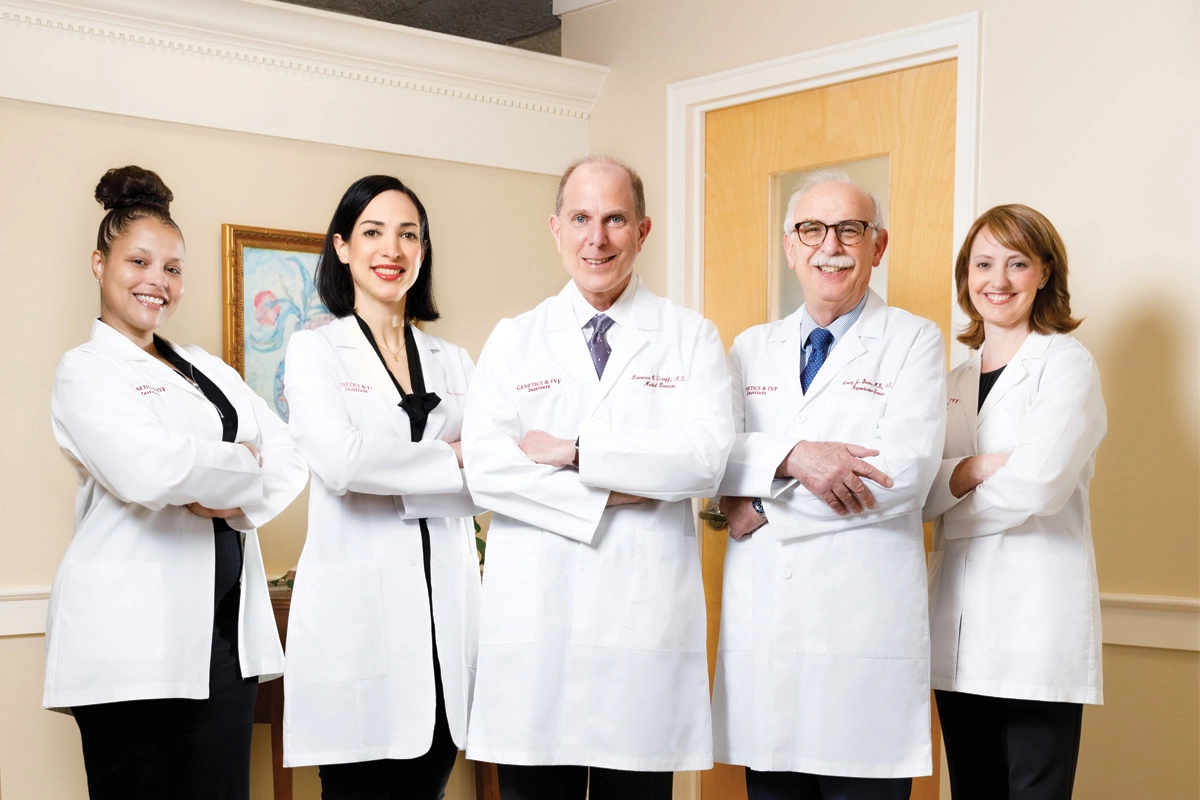There are many reasons a patient may have difficulty getting pregnant. Some include damaged fallopian tubes, male factor infertility, endometriosis, ovulation disorders such as polycystic ovary syndrome (PCOS), advanced reproductive age with decreased ovarian reserve, premature ovarian insufficiency, or unexplained infertility. Fertility treatments can also help patients in the LGBTQ+ community or single/unpartnered patients build their families.
Intrauterine Insemination
Intrauterine insemination (IUI), also known as artificial insemination, is one of the most commonly used assisted reproductive technologies. IUI is a simple, painless, in-office procedure that is accomplished by first monitoring the patient’s cycle using ovulation predictor kits at home or ultrasound and blood tests in the office. Fertility medications are often used to enhance ovulation.

Many patients try intrauterine insemination before IVF because it is a relatively simple procedure.
In Vitro Fertilization
For pregnancy to occur, an egg must be fertilized by a sperm. When fertilization happens inside the body, it’s called in vivo fertilization. When fertilization happens outside of the body, it’s called in vitro fertilization, or IVF.

IVF is also used in conjunction with several other fertility treatements and fertility preservation methods, such as donor egg IVF, Intracytoplasmic Sperm Injection (ICSI), and fertility preservation methods. Such as egg or embryo freezing. Also PGT can be used to screen the embryos for genetic abnormalities or for sex selection.

Donor Egg IVF
There are several factors that make the option of donor egg IVF an excellent choice for a patient, including egg quality, diminished ovarian reserve, and a female patient’s age. According to the American College of Obstetricians and Gynecologists, female fertility begins a significant decline at age 32 and more rapidly declines after age 37. After age 35, most women have a substantially decreased egg quality, which directly impacts the chances of conceiving with their own eggs.

GIVF specializes in donor egg IVF and is proud to have created one of the nation’s most comprehensive and successful donor egg programs. The reproductive clinic offers both frozen donor egg and fresh donor egg services and house the premier frozen donor egg bank, Fairfax EggBank. The ability to provide both fresh and frozen donor egg cycles means that our patients have more options, more control, and can begin treatment quickly. Learn about the Fresh Donor Egg Cycle Process or the Frozen Donor Egg Cycle Process to help you decide which may be right for you.
Surrogacy Program
When a patient is not able to carry a pregnancy, they may decide to use a gestational carrier, also called a surrogate. There are many different reasons why a patient may choose to use a gestational carrier, such as medical concerns with their uterus, or male patients who require a surrogate to carry the child.

Gestational carriers should have had at least one uncomplicated pregnancy and delivery and should be between 21 and 45 years old. A gestational carrier may be a relative, a friend, or an individual previously unknown to the patient. Many patients find gestational carriers through agencies that recruit and screen surrogates and can help match the patient to a surrogate.
Gestational carrier treatment cycles are more complicated than typical IVF treatment cycles. Your GIVF coordinator will guide you through the process, and can make referrals to gestational carrier agencies, including its affiliated company Fairfax Surrogacy, that recruits and perform the initial screening of the surrogates.

Our Team
GIVF Fertility is fortunate to have assembled a team of dedicated professionals. From our office staff to our renowned fertility specialists, you’re in the hands of experts. We are all here to help. Read our blogs to learn more about fertility. Start your parenting journey today. Call us at 1-800-552-4363 or request a consultation.
Since 1984, GIVF Fertility has been a leading fertility center and a pioneer in reproductive medicine. Its board-certified reproductive specialists are experts in in vitro fertilization, intrauterine insemination, donor egg IVF, as well as services for patients working with surrogates. If you’re looking into fertility treatments, the GIVF team will walk you through every option that fits your needs with care and compassion. Together we build a family.
This is a sponsored post. If you are interested in advertising with Northern Virginia Magazine, click here.





